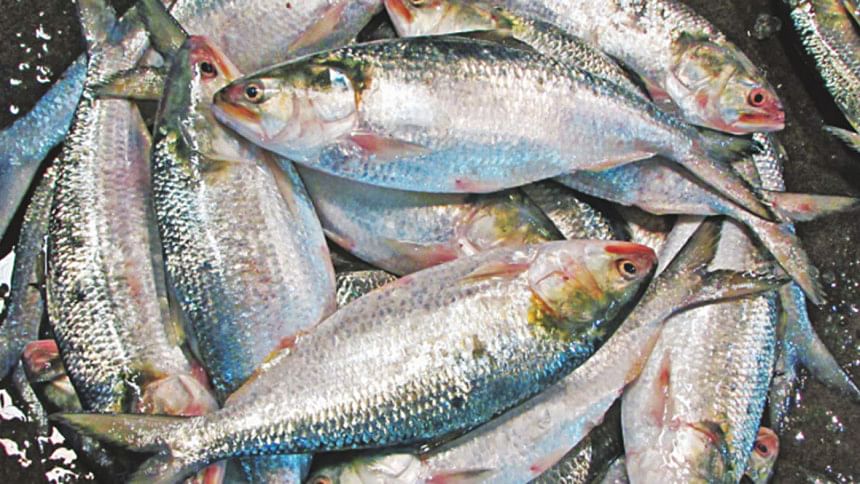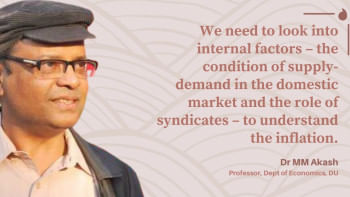The fishbones of Bangladeshi capitalism

We are what we eat. So, following that logic, those who are resorting to eating Pangas fishbones after buying them from a Jatrabari market, as seen in a recent news feature, are like the bones of a fish. They constitute the structure of a fish but are not that palatable for those who can afford the fish meat. The metaphorical fish I am trying to allude to here is Bangladesh's economy and the people who have to resort to eating the refuse of the upper class are its skeleton. But it seems like our economy is doing very little to take care of its skeleton.
Bangladesh has seen extraordinary economic expansion over the last 15 years. The GDP has grown at a remarkable pace and capital has become ever stronger with its growth. However, the growth of the GDP has not resulted in the growth of the standard of living of the middle and lower classes, as many are one shock away from going below the poverty line. The growth of our economy has been grossly uneven, with the number of millionaires skyrocketing and the lower class failing to make ends meet at the same time. The height of this is the inability of the working class to afford its daily meals. Price hikes have gone to such a level that regular people are not able to buy even basic produce, like eggs, seasonal vegetables, rice, and lentils. Buying meat or fish has become a far cry. That is why more people are crowding to these "markets of refuse" where you can buy fishbones or chicken legs, which the upper class wouldn't dare to eat.
This is the classic case of the failure of the trickle-down idea of neoliberal economics. The idea goes thus: if the capital grows in a country, it will definitely benefit the whole of the economy as more and more wealth gets generated because ever-growing investments would lead to the rise of employment opportunities and the standard of living of the lower class would also rise. However, this has not been true for Bangladesh. Capital, here at least, has been appropriated by a small minority of people through patronage and corruption, with only a few exceptions. The working class has been bound to work at limited-paying jobs that do not offer pay rises to keep up with the inflation. As such, the earnings of the working class keep losing value over time. Whatever savings these people may be able to amass, keep shrinking each year. In these times, there is no way other than going to the fishbone market. And the gross body of devouring capitalism keeps standing and growing on top of the labour of the consumers of refuse.
And like the refuse of the fish, the working class is also a refuse of the capitalist economy, if the bourgeoisie seems fit. The worker, here, is seen as completely fungible and their jobs at, say the garment industry, do not give them the option of career growth, but traps them in an unskilled position for as long as needed. And when they rebel and demand for higher wages, the state comes in as an arbiter of the capital power and squashes unrest on the capital's behalf. The price of the worker is even less than the Tk 20-30 per piece fishbone at the Jatrabari market when seen from the lens of the millionaire capitalist who can buy another unskilled worker from the reserve army of the unemployed very easily.
The middle class, dreaming of becoming like the bourgeoisie one day, has been subdued into sleep to prolong their petty dreams. They would not express solidarity with their working class brothers and sisters for the demands of a fairer economy that works for everyone. But reform is deeply necessary in the country, because an economy that does not take care of its working class can never be deemed as a progressive economy. All the talk of progress that we hear on the news rings hollow today and begs the question: progress for whom?
But where is the government's response? Instead of addressing these concerns that involve the lives of millions of people, the government is only doing more to harm the ones who are in crisis. Bailing out millionaires, printing money and waiving loans would only depreciate the value of the taka and worsen the economic crisis. We only hear of assuaging rhetoric from politicians, but no proper actions are taken to permanently put a rein on the ever-growing price of commodities. TCB trucks that sell daily necessities at a lower price are stopgap solutions, not real economic reforms, and even they are hard to access. We need to implement proper economic solutions that include provisions of welfare and social safety nets to make sure that the working class is taken care of and nobody has to resort to eating fishbones instead of fish meat to accommodate their monthly budget.
Only words are not enough for this task; action is necessary. An organised people's movement is the need of the time. But who would organise such a movement? Who has the courage or the interest? The role of the left parties could be essential here, but even they don't seem to care much anymore beyond their own rhetoric and infighting. But even if the parties fail, and with people left without any choice, they will lead their own movement on to their own interests, as history has shown many times before. It is time for the fishbone to reclaim its position within the whole fish. Here is to wishing for that beautiful day to arrive.
Anupam Debashis Roy is a postgraduate student at the London School of Economics (LSE).
Views expressed in this article are the author's own.
Follow The Daily Star Opinion on Facebook for the latest opinions, commentaries and analyses by experts and professionals. To contribute your article or letter to The Daily Star Opinion, see our guidelines for submission.

 For all latest news, follow The Daily Star's Google News channel.
For all latest news, follow The Daily Star's Google News channel. 











Comments